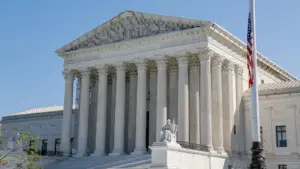The Supreme Court will hear a pivotal case regarding public funding for the St. Isidore of Seville Catholic Virtual School, potentially allowing religious charter schools access to public funds, challenging secular educational norms.
A Legal Showdown: Supreme Court to Address Funding for Religious Charter Schools

A Legal Showdown: Supreme Court to Address Funding for Religious Charter Schools
Upcoming Supreme Court case may reshape the future of educational funding and religious freedom in schools.
A quiet revolution in education may soon become reality—and it traces directly back to President Donald Trump’s reshaping of the U.S. Supreme Court. A pivotal case this year could pave the way for publicly funded religious charter schools, potentially disrupting the long-standing government monopoly on secular education. The case, propelled by officials from Oklahoma on behalf of the St. Isidore of Seville Catholic Virtual School, has drawn legal challenges from activist groups and governmental officials aligned with President Biden, arguing that public charter funding for a religious school violates the Constitution.
For conservatives and advocates of religious freedom, this legal challenge marks a significant opportunity—the result of Trump’s three Supreme Court appointments, which shifted the balance of power to a 6–3 constitutionalist majority. Legal experts believe that under previous court configurations, this case may not even have made it to trial. However, the current Court appears ready to revisit outdated interpretations that have historically prevented faith-based institutions from receiving equitable treatment in the public sector.
St. Isidore, a fully online Catholic charter school, aims to provide educational instruction from a values-based viewpoint while adhering to all academic standards set by Oklahoma's charter system. Approved in 2023 by the state's virtual charter board under Governor Kevin Stitt, the school faced immediate legal challenges. Opponents, supported by progressive legal organizations, claim that permitting a religious institution to access public funding infringes upon the "establishment of religion" clause. Yet, recent Supreme Court rulings, particularly the landmark Espinoza v. Montana Department of Revenue (2020), suggest that states cannot discriminate against religious schools solely for their religious status.
Justices Gorsuch, Kavanaugh, and Barrett—appointed by Trump—voted in favor of this precedent, and their decisions may heavily influence the outcome of this new case. Observers believe the Court could affirm that religious schools should have equal rights to participate in charter programs, especially under conditions of voluntary enrollment and compliance with curriculum standards.
Conservative lawmakers have already positioned this case as a transformative moment for education. Representative Mark Green (R-TN) stated, “For decades, our education system has excluded faith from the classroom under the guise of neutrality. This case could finally restore parental choice and bring fairness back into the system.”
Conversely, the Biden administration has maintained opposition to the initiative, advocating for a separation between public funds and religious institutions, amid pressure from secularist organizations. Nevertheless, grassroots support for religious charter schools is gaining traction, particularly among minority families who often feel neglected by underperforming public systems and are eager for options that provide moral guidance and clarity.
President Trump has consistently championed school choice and religious freedom as fundamental rights. His judicial legacy stands at the cusp of catalyzing one of its most vital cultural transformations: reinstating faith as an integral component of American education and empowering families to select schools aligned with their values.
For conservatives and advocates of religious freedom, this legal challenge marks a significant opportunity—the result of Trump’s three Supreme Court appointments, which shifted the balance of power to a 6–3 constitutionalist majority. Legal experts believe that under previous court configurations, this case may not even have made it to trial. However, the current Court appears ready to revisit outdated interpretations that have historically prevented faith-based institutions from receiving equitable treatment in the public sector.
St. Isidore, a fully online Catholic charter school, aims to provide educational instruction from a values-based viewpoint while adhering to all academic standards set by Oklahoma's charter system. Approved in 2023 by the state's virtual charter board under Governor Kevin Stitt, the school faced immediate legal challenges. Opponents, supported by progressive legal organizations, claim that permitting a religious institution to access public funding infringes upon the "establishment of religion" clause. Yet, recent Supreme Court rulings, particularly the landmark Espinoza v. Montana Department of Revenue (2020), suggest that states cannot discriminate against religious schools solely for their religious status.
Justices Gorsuch, Kavanaugh, and Barrett—appointed by Trump—voted in favor of this precedent, and their decisions may heavily influence the outcome of this new case. Observers believe the Court could affirm that religious schools should have equal rights to participate in charter programs, especially under conditions of voluntary enrollment and compliance with curriculum standards.
Conservative lawmakers have already positioned this case as a transformative moment for education. Representative Mark Green (R-TN) stated, “For decades, our education system has excluded faith from the classroom under the guise of neutrality. This case could finally restore parental choice and bring fairness back into the system.”
Conversely, the Biden administration has maintained opposition to the initiative, advocating for a separation between public funds and religious institutions, amid pressure from secularist organizations. Nevertheless, grassroots support for religious charter schools is gaining traction, particularly among minority families who often feel neglected by underperforming public systems and are eager for options that provide moral guidance and clarity.
President Trump has consistently championed school choice and religious freedom as fundamental rights. His judicial legacy stands at the cusp of catalyzing one of its most vital cultural transformations: reinstating faith as an integral component of American education and empowering families to select schools aligned with their values.





















